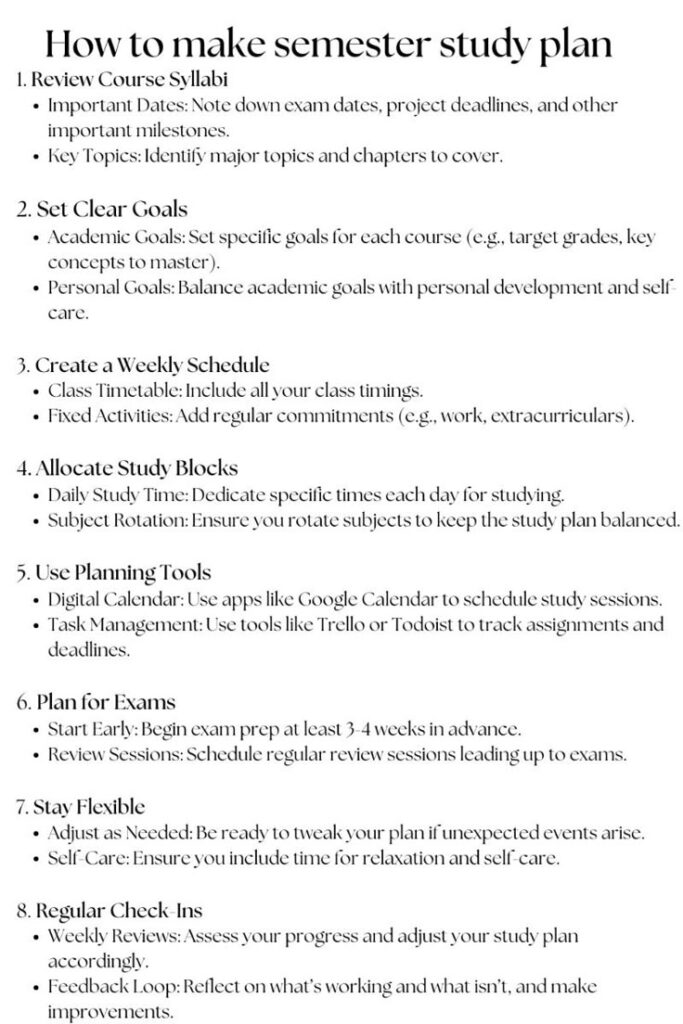A successful semester starts with a solid study plan. Whether you’re a high school or college student, having a structured approach to managing your studies can help reduce stress and improve performance. Below, we outline a step-by-step guide to creating an effective semester study plan that keeps you on track and maximizes your learning potential.
1. Review Course Syllabi
Your course syllabus is your roadmap for the semester. Take the time to go through each syllabus carefully and note the following:
- Important Dates: Mark exam dates, project deadlines, and significant milestones in your planner.
- Key Topics: Identify the major topics and chapters that will be covered in each course. This will help you prioritize your study sessions.
- Workload Expectations: Understand the reading assignments, essays, and research projects required for each subject to allocate your time efficiently.

2. Set Clear Goals
Setting goals gives your study plan direction and purpose. Consider both academic and personal goals:
- Academic Goals: Define what grades you aim to achieve and the key concepts you need to master. Setting SMART (Specific, Measurable, Achievable, Relevant, and Time-bound) goals can improve focus and motivation.
- Personal Goals: Balance your academic objectives with self-care, hobbies, and personal growth activities. Research suggests that a well-rounded schedule reduces burnout and increases productivity.
3. Create a Weekly Schedule
A well-organized weekly schedule ensures you stay on top of your academic responsibilities while maintaining a balanced life:
- Class Timetable: Write down all your class timings so you can plan around them.
- Fixed Activities: Include extracurricular activities, part-time jobs, and other commitments to ensure you allocate realistic study hours.
- Optimal Study Hours: Identify when you’re most focused (e.g., morning, afternoon, or night) and schedule demanding subjects during these peak productivity periods.
4. Allocate Study Blocks
Organizing your study time efficiently helps in retention and understanding of concepts:
- Daily Study Time: Dedicate specific hours each day to studying to create consistency.
- Subject Rotation: Avoid burnout by rotating subjects and topics to keep your study sessions engaging.
- Active Learning: Instead of passively reading, use techniques such as summarizing notes, teaching concepts to a peer, or applying concepts to real-world scenarios.
5. Use Planning Tools
Utilizing digital tools can keep you organized and on track:
- Digital Calendar: Use apps like Google Calendar to schedule study sessions and avoid last-minute cramming.
- Task Management: Tools like Trello or Todoist can help track assignments, deadlines, and progress.
- Pomodoro Technique: Consider time-management strategies such as the Pomodoro method (25-minute focused study sessions with short breaks) to maintain concentration and efficiency.
6. Plan for Exams
Effective exam preparation starts well before the test date:
- Start Early: Begin reviewing materials at least 3-4 weeks before exams to avoid cramming. Research suggests that spaced repetition improves retention.
- Review Sessions: Schedule regular review sessions to reinforce learning and identify weak areas.
- Practice Tests: Use past papers or create mock exams to familiarize yourself with question formats and time constraints.
7. Stay Flexible
Unexpected events can disrupt even the best-laid plans, so flexibility is key:
- Adjust as Needed: Be prepared to tweak your study plan if unforeseen circumstances arise.
- Self-Care: Incorporate breaks and relaxation time to maintain mental well-being. Studies have shown that taking regular breaks enhances cognitive function and learning retention.
8. Regular Check-Ins
Frequent assessments of your study plan ensure that you stay on track:
- Weekly Reviews: Evaluate your progress and make necessary adjustments.
- Feedback Loop: Reflect on what’s working and what isn’t, then refine your plan accordingly.
- Accountability Partner: Consider partnering with a classmate or mentor to stay motivated and receive constructive feedback.
By following these steps, you can create a well-structured and effective semester study plan. The key is consistency, adaptability, and ensuring a balance between studies and personal well-being. Stay organized, set clear goals, and make the most of your academic journey!









 Evan John
Evan John